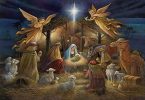A lesson to ponder all through our life
6th Sunday of Lent (Passion Sunday/Palm Sunday)
Scriptures: Is. 50:4-7; Ps. 21:8-9, 17-20, 23-24; Phil. 2:6-11; Mk. 14:1-15:47
We reflected during this season of Lent on the theme of journey. Each Sunday’s liturgy gave us an insight into our spiritual journey. We have finally arrived at the destination along with Jesus today when we celebrate Passion Sunday. The liturgy invites us to look at Jesus who came to the final destination of His life’s journey. One expects after reaching the destination that he/she would be rewarded. He would be treated with honours. His efforts would be recognized. But we do not find any such thing happened in Jesus’ life.
Jesus was received in the city of Jerusalem with great honour. We heard it in the service of blessings of the palms before the mass. Jesus rode on the colt which was not used before. It was a sign of his messianic entry into Jerusalem. The king always entered into the city, sitting on the donkey. The people sang hosanna to welcome their king. The riding on a donkey was an act of kingship. The donkeys were used in royal ceremonies in the ancient near eastern culture. The man who rode on the donkey never looked for war but peace. The people gave Jesus a royal welcome in the city but perhaps with different motives. Many of his disciples must have thought that their journey was over. Jesus would soon acquire his throne in Jerusalem.
As a matter of fact, Jesus undertook yet another journey in his life. The final and decisive journey that changed the lives of every human being. This journey was full of pain, suffering, agony and humiliation. As Jesus walked towards his final destination, his every step was filled with pain and suffering. We have an account of Jesus’ passion according to Mark for this year’s liturgical cycle. It will be complemented with St. John’s Gospel on Good Friday.
Mark narrates Jesus suffered at every step of his journey towards his final destination once he reached Jerusalem. He was cheated by Judas, his disciple. He was denied by Peter three times. The disciples were not able to keep watch with him in the Garden of Gethsemane. He was betrayed by an act of love i.e. kiss. He was insulted and ridiculed during his trial. They brought false witnesses to condemn him to death. They brought him to Pilate to condemn him to be crucified. He was flogged and crowned with thorns. They beat him, slapped him and made fun of him. They spat on his face. He was made to carry the cross to Calvary. He was crucified among the thieves. They taunted him to come down from the cross. He was abandoned by his disciples. Every act of all those who were present there pierced his heart and made his journey difficult till he breathed his last.
How could Jesus bear all the suffering when he was innocent? The two readings and the psalm reveals to us the answer. Prophet Isaiah in the first reading tells us about the suffering servant. The psalmist speaks about a person who is God forsaken and St. Paul talks about Jesus who was God but became man. All of them refer to one who is suffering for God. The servant in the first reading, had freely chosen to suffer and die for the sake of God. He is known as the suffering servant. He silently accepted the suffering. He could do it because he knew that he was chosen for the mission. He was convinced of God’s help. He was totally under the protection and care of God. The servant was aware of God’s special love for him. He would not let him put to shame.
The psalm is of the cry of God forsaken. It is attributed to King David and his life situation but it is fitting to Jesus more than David. Jesus felt abandoned by his Father during the time of agony. Each and every word of the psalm is so true in the life of Jesus. This psalm might have been the meditation of Jesus on the cross. But at the end of the Psalm, the psalmist feels confident that the one who fears the Lord, will not be dismayed. The experience of affliction and crises did not make those in despair lose any sense of confidence in God’s power and authority. The Lord reigns over all the earth. The psalm which had started with a cry ends with hope in Christ.
St. Paul in the second reading gives us an early understanding of Jesus’ life and mission. Jesus’ kingship was of service to others. He was willing to die for others. He did not keep anything with himself. He emptied himself to save us from the sins. Jesus humbled himself for us. Jesus did it voluntarily for our sake. Therefore, God exalted him over all the earth that every knee should bend, in heaven and on earth, and every tongue should confess that Jesus Christ is Lord, to the glory of God, the Father.
Jesus could overcome all the obstacles and unfailingly arrived at his final destination because he had total trust in God. Jesus endured suffering and pain because he was confident in God, his Father. He knew that God was with Him in his mission. He knew that His Father reigns over all the earth. He knew that His Father loves him more than anything in the world.
As we come to the final point of our journey of Lent, let us meditate on the passion, death of our Lord. Let us reflect on Jesus who walked the extra miles, overcoming obstacles to reach his final destination unfailingly. Let us concentrate on the confidence of Jesus in God, His Father during his pain and suffering. May we draw strength from Jesus to endure our suffering by concentrating on the love of God.






